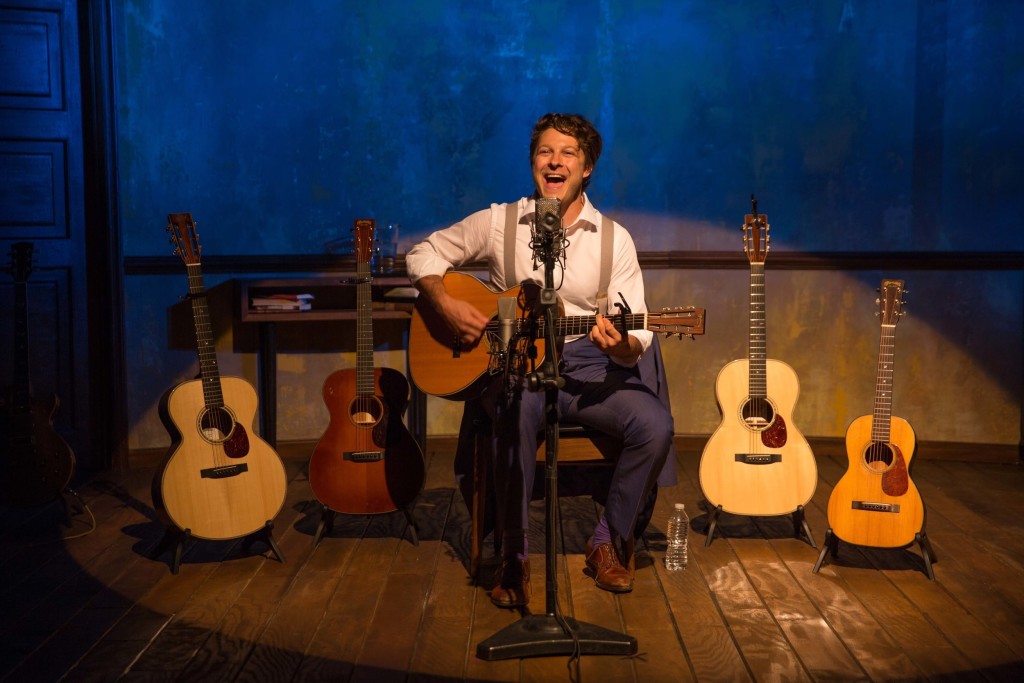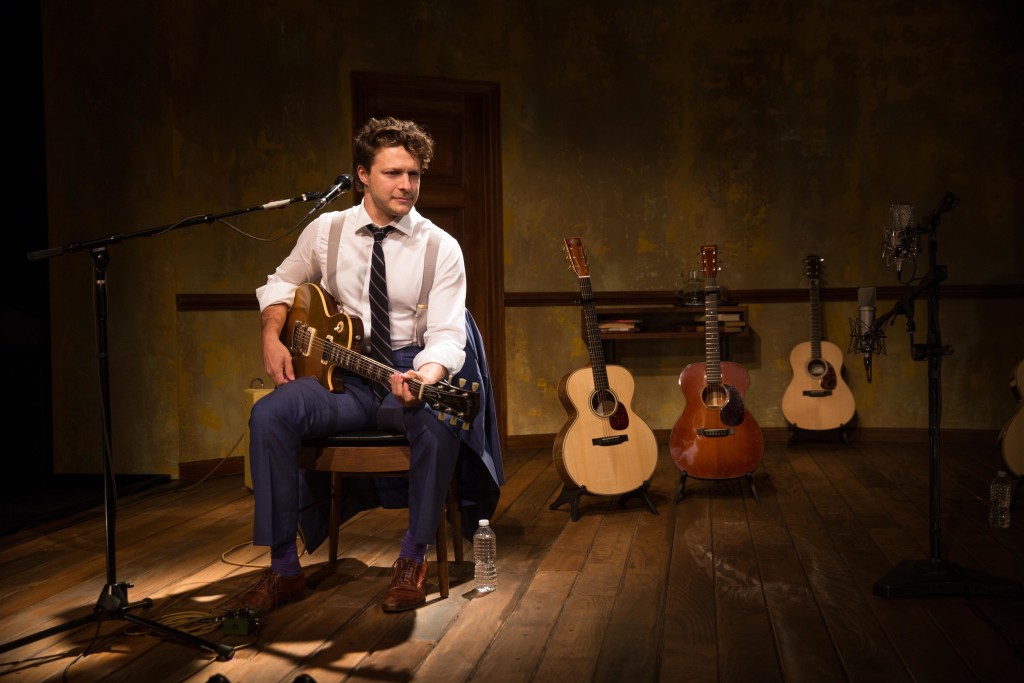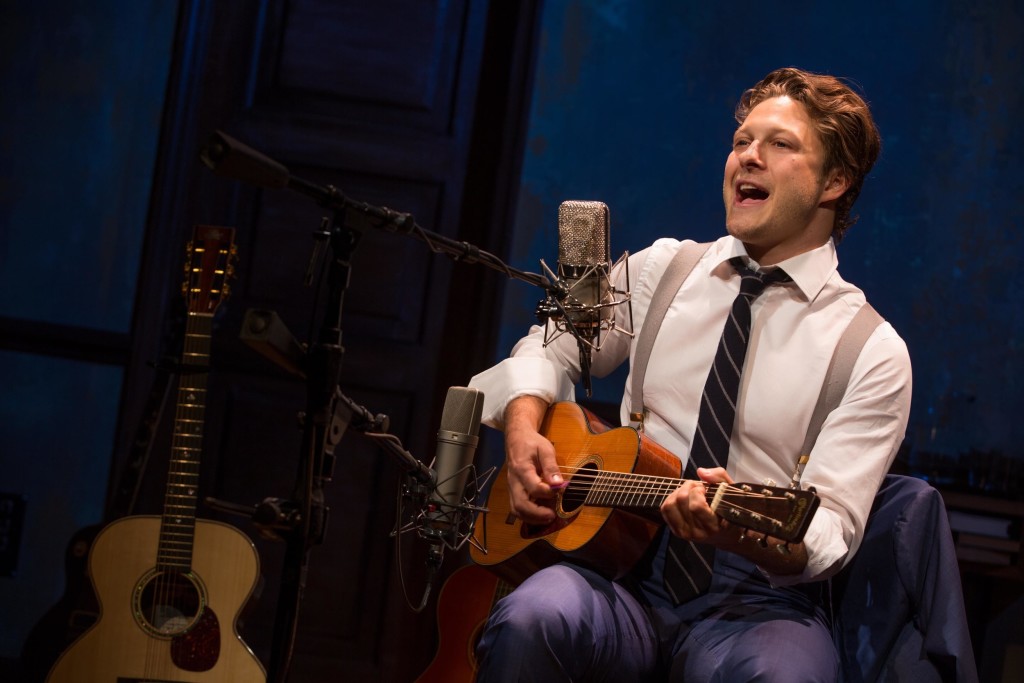
The Lion is not a musical. It is not a concert. It is storytelling, and it is raw—as raw as high school mixtapes or letting someone braid your hair. Benjamin Scheuer, a candidate for the role of Marcus Mumford’s blonde cousin, is the only actor on the cozy A.C.T. stage (besides his six guitars, characters in their own right). In this show, he is not an actor in the traditional performative sense. He is an actor in the truest sense of the word, a participant in an action or process—the process of his own life.
Scheuer’s one-man folk musical has been met with critical acclaim from Edinburgh to New York City, and now San Francisco has the privilege of witnessing this non-musical musical during its brief run at the A.C.T. Theater (April 19-May 1, 2016). The show feels like spending a night in a new friend’s living room as he plays guitar and tells you about his life, and often does both. Scheuer shares his own story through a series of mostly folk, some rock songs. If the lack of costumes, dance numbers, and extravagance isn’t enough to make it clear how atypical this is for the musical theater genre, you can tell by the feet. Young actors learn to always plant their feet; Scheuer’s feet are never still. Even while sitting, he taps his toes, rocks his ankles. As the chronology of his life progresses through song, his suit jacket comes off. When his father dies, he unbuttons his top button and rolls up his sleeves. When he gets diagnosed with cancer, he takes off his shoes and socks and rolls up his pants. Actors in musicals wear shoes in their living room sets; people in real life put their bare feet on the furniture. Songs in musicals are written to propel an established plot. Songs in The Lion were written by the plot of Scheuer’s life.

As atypical as The Lion is, a concert-like folk musical is as much of an “Of course this works!” moments as the hip-hop musical. Both genres are centered around lyric and narrative, which is really the crux of the musical genre. Scheuer has said that rather than a genre, artists should think of musical as a methodology. As a methodology, it allows for honesty, truth, narration, and cheesy love songs called “Laugh.” Even when singing songs he wrote for his now ex-girlfriend Julia, Scheuer is present in the moment, laughing and in love with the memories. Pink lighting matches his buoyancy in the same way that red lighting matches his high school, electric guitar-ridden angst. In The Lion, there is a beautiful, honest story, and there are beautiful, honest moments. Like in life, it is these moments that make it truly special.
What better way to get to know someone than by learning that they always smile with their teeth? In the middle of a discordant rant about his cancer, Scheuer stops his guitar all together and, making eye contact with the audience, reprises earlier lines from the show a capella; “It’s the courage we show facing things we don’t know, it’s the way that we weather the storm.” When he slipped up on a line and said something about not being able to relate to his father after his mother died, he paused a second, shook his head and said “I’m sorry, I meant relating to my mother after my father died.” Instead of going on with the show, Scheuer simply corrected what he said, because he was simply having a conversation with the audience. A conversation filled with powerful moment after moment, from lines that take on the perspectives of Julia, his girlfriend, and Rick, his father, to phrases like “the paramedics were giants in the room” and “escape to invisible cities.”

In turning the extreme universality of a series of life events sprinkled with meaningful moments into a public performance, Scheuer has left us with a gift. In the program notes, Scheuer says “I worried that many of the things I sang about were so personal that no one was going to understand. I learned the opposite is true.” Of course we understand, probably more than we understand other musicals that require symbols and spectacle and a suspension of disbelief. This is not a show to unpack; this is just life and death and family and illness, on stage. Offstage, we also try to face these things with courage and bare feet and toothy smiles and roars. If Scheuer’s performance is not enough of an inspiration to artists, he also leaves this advice: “Write down the one thing you don’t want anyone to know about you. The single most terrifying thing. Start writing your next piece there.” These words and the entire show are not just inspirational for artists, they are inspirational for everyone. They encourage us to be raw with ourselves and with others. They say, “let yourself sing, and let your voice break while doing it.”
Photos courtesy of Matthew Murphy
